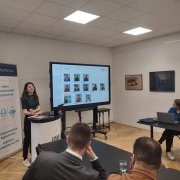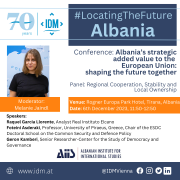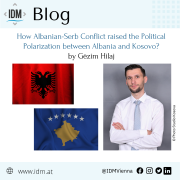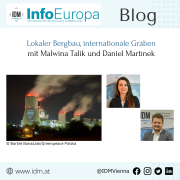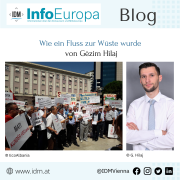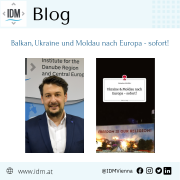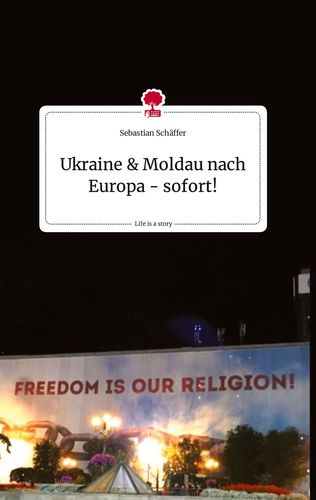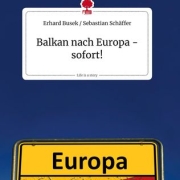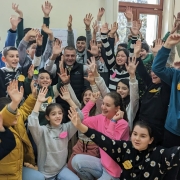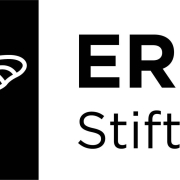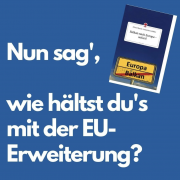Albania’s strategic added value to the European Union: shaping the future together
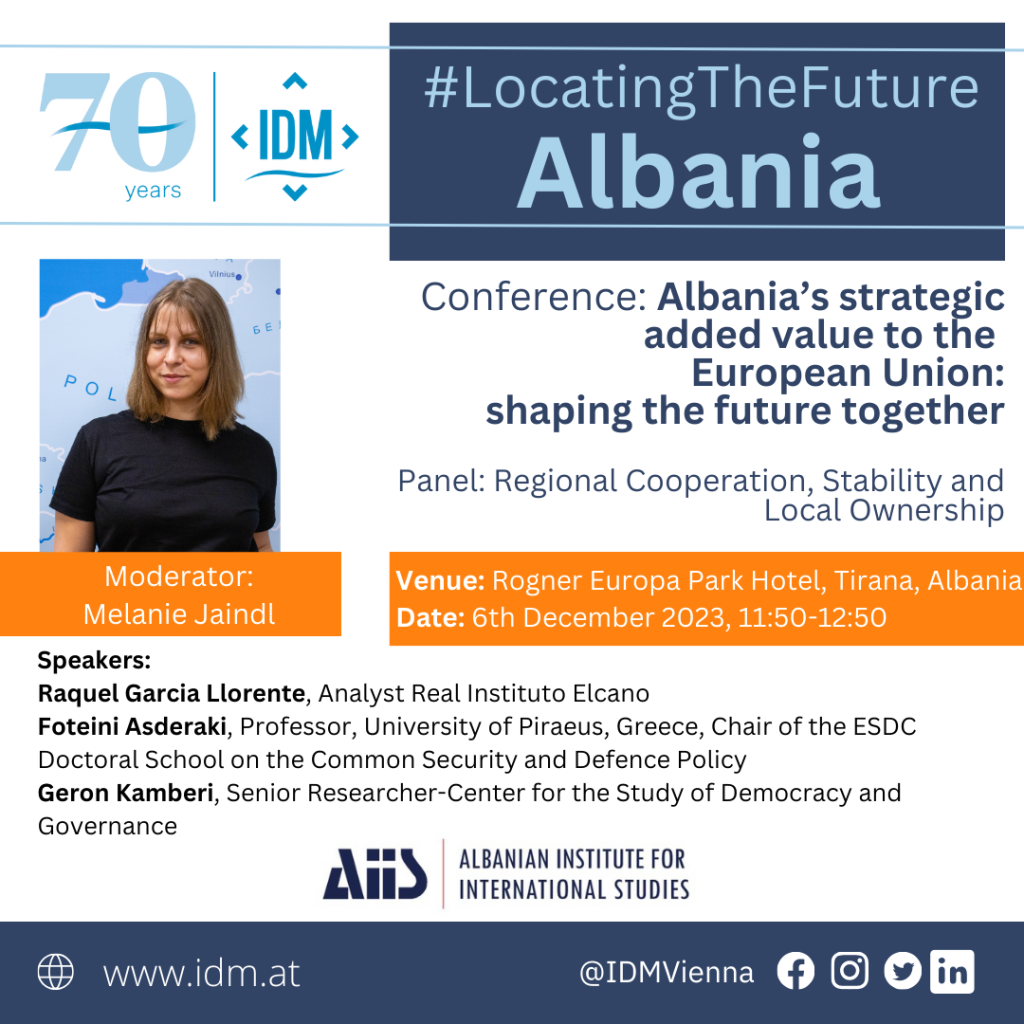
On 6th December, the conference “Albania’s strategic added value to the European Union: shaping the future together” organized by the Albanian Institute for International Studies (AIIS) and co-organized by IDM is took place in Tirana. Research Associate Melanie Jaindl moderated the panel “Regional Cooperation, Stability and Local Ownership” with following speakers:
Raquel Garcia Llorente, Analyst Real Instituto Elcano
Foteini Asderaki, Professor, University of Piraeus, Greece, Chair of the ESDC Doctoral School on the Common Security and Defence Policy
Geron Kamberi, Senior Researcher-Center for the Study of Democracy
and Governance
The conference was visited by important stakeholders such as EU delegates and ambassadors, scholars and policy advisors, and received significant media attention in Albania.
Further co-organizers:
- EU Delegation to Tirana
- Embassy of Spain
- Embassy of Italy
- Embassy of the Federal Republic of Germany
- Austrian Embassy
- Embassy of Greece
- Albanian Media Institute
How Kosovo Albanian-Serb Conflict raised the Political Polarization between Albania and Kosovo?
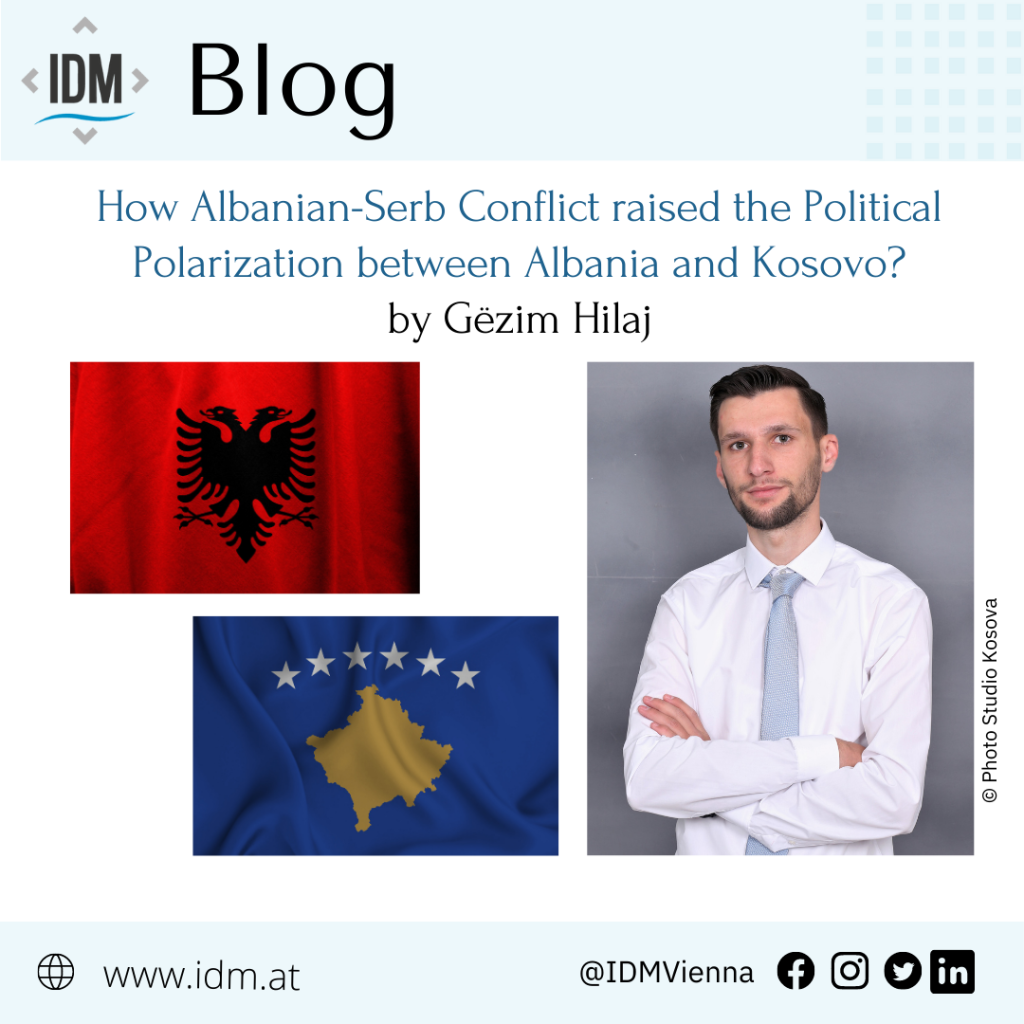
“Albania-Kosovo meeting cancelled”, “Albanian – Kosovo joint meeting cancelled” “Government: It is the first time that a meeting of two governments has been unilaterally cancelled”, “Rama confirms the cancellation of the meeting of governments” On 13th June, a day before the ninth joint meeting between the Albanian and Kosovan governments that was to take place in Gjakova, those headlines spread rapidly in Kosovan, Albanian and international media. The prime minister of Albania, Edi Rama, announced in the last minutes that he would cancel the meeting. During the press conference, Rama claimed that the meeting could not be held “in the circumstances of Kosovo’s aggravated relations with the entire Euro-Atlantic community”, referring to international criticism of Kosovo’s handling of developments in its northern Serb-majority municipalities. During the governments’ joint meeting, ten agreements should have been signed. One of the most important was the mutual recognition of lawyers and mediators in resolving disputes.
The same day, Kosovo’s prime minister Albin Kurti refused Rama’s draft charter for the creation of the Association of Municipalities with a Serb majority in the north of Kosovo. According to Rama, this plan would de-escalate the situation and normalise Kosovo’s relationship with the international community. However, he never introduced the document to the public, keeping it confidential.
Kurti reminded Rama about Albania’s constitutional duty to deal with national unity and the citizens of Kosovo. Kurti added: “Rama should hand over that draft to Aleksandar Vučić [President of Serbia] for the Albanians living in Serbia”. The relationship between Kosovo and Albania has thus turned into a personal fight: Edi Rama vs Albin Kurti.
The Consequences of Partisan Media
In Albania, there are currently hundreds of talk shows, news editions and opinion leaders trying to explain why Kurti refused Rama’s plan or find out who really cancelled the joint meeting, Kurti or Rama. Who is at fault in this situation? The manner in which the media handled the issue was and continues to be like the third season of a soap opera. What is sure is that this is a manifestation of political polarisation. According to a study by Pew Research, people give more weight to statements that support their own views – be it on the left or right spectrum of politics. Frequently, some media outlets in Albania known for supporting Rama`s government criticized Kurti. Albanian and Kosovan media supporting Kurti campaigned against Rama’s policies and his political rhetoric about the Kosovo case. The media has thus played an important role in creating a split: Nationalists who support Kurti`s political rhetoric, and the Rama supporters who idealise or adore him as a Western Balkan leader, who is able to solve the problems between Western Balkan countries.
The Personal Fight: Rama vs Kurti
Across the world, societies polarise politically. The tone of political debate has hardened in recent years, and the political left and right increasingly seem to perceive each other as enemies instead of opponents.1 On the one hand, Rama is trying to be the referee in the conflict in the north of Kosovo. On the other hand, Kurti’s belief that his approach in dealing with Serbia is better than Rama`s hazards the consequences of the European Union’s sanctions towards Kosovo. A central aspect of political polarisation is a strong belief in the moral superiority of one’s own ideological beliefs, which easily prompts the assumption that alternative ideological beliefs are morally inferior. In this context, the confidence of both prime ministers in their own correctness had caused political polarisation, which may lead to overconfidence in decision-making. For instance, on his Western Balkan tour Rama could not have a meeting with his Kosovan counterpart, but only with Kosovo’s president, Vjosa Osmani-Sadriu, and the chairman of the parliament, Glauk Konjufca. The overconfidence of Kurti and Rama in their ideas is damaging the two countries. They are still not able to sit together to discuss what is going wrong in Kosovan or Albanian government policies. Rama accused Kurti of raising tensions with the persistence he showed by returning four mayors to their municipality offices. From the nationalist idea of a “Greater Albania” to diplomatic meetings, and now using Kosovo politically for their own battles, it is clear Kosovo-Albania relations are regressing day by day. The leaders’ overconfidence is weakening Albania and Kosovo-Albanians because the government is playing a neutral role instead of supporting the integrity of the Republic of Kosovo. When the war started, Albania became one of the main destinations for refugees from Kosovo. Albania sheltered thousands of refugees during that period. In the war, the Albanian army also helped with weapons. Since Kosovo’s independence in 2008, both countries had good relations which were always preceded by national priorities, but there is also ongoing political and economic cooperation. In the political-diplomatic sphere, the state of Albania and its diplomacy have been quite active in the recognition of the Republic of Kosovo. It is clear that the relationship between the two countries is now damaged. On the one hand, the opposition in Kosovo is blaming Kurti, while on the other hand, the Albanian opposition is blaming Rama.
Post-Truth Symptoms in Media
Further, “alternative facts”, a term coined by the previous US administration under President Donald Trump (basically meaning false statements), have helped to fuel polarisation. Regularly, the Albanian public was exposed to “alternative facts” when Serbian police forces arrested three Kosovo police officers. In the beginning, the media reported the kidnapping of three police officers, which it then labelled as arrests. There are two different versions of the same events on 14 June: in North Kosovo; Belgrade Says Arrest Took Place On its Territory. As the journalist Matthew D`Ancona writes in the book Post-Truth, “Nowadays it is more important the intensity of the drama than accuracy. The reality and entertainment have taken on the same meaning for the public”.2
The political polarisation was already visible before, in the last days of May, when the situation escalated in the north of Kosovo. Soldiers from a NATO-led peacekeeping force were injured in clashes with Serb protesters while defending three town halls with Kosovo-Albanian mayors. The Serbian president put the army on the highest level of combat alert. Serbia continues not to recognise Kosovo as an independent country and still believes that Kosovo is part of Serbia based on the infamous project “Nacertania” of 1844, which aimed to oppose the idea of the Albanian State establishment and the displacement of Albanians from their ethnic land. This rhetoric from Belgrade strongly contributes to ethnic polarisation, which is dangerous. Its impact was also shown in the violent protests by Serbs in Mitrovica.
Another micro-level symptom of polarisation was the protest organised by Albanians in front of the government building in support of Kosovo after the tensions in its north and the cancellation of the joint meeting between Rama and Kurti. Citizens displayed Albanian, Kosovan and UÇK flags with the slogan: “We Want National Unity (Greater Albania)”.
With all the hot issues to be solved in the Western Balkans, the question remains whether the political polarization between Albania and Kosovo can at least be again alleviated.
Media Framing in Kosovo and Albania
We cannot predict the future, but if Kosovo and Serbia continue the conflict under the generally difficult geopolitical situation, society will suffer the consequences of creating enemies. Media has been framing Albanians and Kosovans as brothers for a long time. Things have changed because in some media in Albania and Kosovo, Rama is now framed as a friend of Vučić who is selling out the national interest and Kosovo for his own interest. In the partisan Albanian-Kosovan media, there is a framing convergence on Rama. Not only has the traditional media helped to build this framing, but social media has had a huge impact too. Also, the leader of the opposition in Albania, Sali Berisha, used Facebook to strengthen the framing of Rama as a friend of the Serbian president. Media has an impact on people`s opinions about Albania-Kosovo relations. The political polarisation caused violence in the parliament of Kosovo when Albin Kurti was attacked physically by the opposition parliament members. The question is if this polarisation will raise tensions and damage the Kosovan reputation in front of Europe and the USA?
Reducing both ethnic and political polarisation in Kosovo, Albania and Serbia will require efforts to promote dialogue and understanding between different groups, as well as accountability in the political system. The biggest challenge is to have media freedom and to promote objective reporting to reduce polarisation and promote democratic values.
Gëzim Hilaj is a journalist, who has a Bachelor Degree in Journalism at the University of Tirana. Currently working as a journalist at the Albanian Public Television, RTSH and writer of many articles in media outlets in his country. Also he is the winner of the third fact checking award in Albania and selected as one of the 15th best young journalists in the world by the Thomson Foundation.
Lokaler Bergbau, internationale Gräben

Das polnische Kohlekraftwerk Turów entzieht tschechischen Gemeinden das Grundwasser. Das führte zu einer fast zweijährigen diplomatischen Eiszeit zwischen beiden Ländern. DANIEL MARTINEK und MALWINA TALIK erklären in ihrem Beitrag die unterschiedlichen Länderperspektiven auf das Thema.
Der Text wurde in der Ausgabe 2/2023 von Info Europa veröffentlicht. Die vollständige Ausgabe ist hier zu lesen.
»Bagger kommen jeden Tag näher an unsere Häuser und die negativen Auswirkungen des Tagebaus werden immer schlimmer.« Das schreibt der Nachbarschaftsverein Uhelná in einem offenen Brief an die tschechische Regierung im Mai 2021. Die gleichnamige nordböhmische Gemeinde ist eine von vielen, die von den Umweltbelastungen des polnischen Kohlekraftwerks Turów betroffen ist. Im selben Monat ordnete der Europäische Gerichtshof (EuGH) die Einstellung des Tagebaus an, der Kohle zum Kraftwerk fördert. Im Urteil heißt es, dass »drohende Schäden für die Gesundheit der tschechischen Bevölkerung und die Umwelt unumkehrbar sind, während es sich auf polnischer Seite um kompensierbare finanzielle Schäden handelt«. Sollte die Kohleförderung nicht umgehend eingestellt werden, falle eine Strafe an die EU-Kommission von einer halben Million Euro pro weiterem Betriebstag an.
Die Entscheidung des EuGH war ein Schock für Polen und spaltete die Gesellschaft. Die einen warfen der polnischen Regierung Ignoranz vor, die anderen meinten, die tschechische Regierung übertreibe mit der Klage und nutze das Thema für die anstehenden Parlamentswahlen aus. Polen setzte die Arbeiten im Tagebau ungeachtet des EuGH-Urteils fort. Zwar kamen Polen und Tschechien kurz darauf zu einer Einigung, vorerst merken die Einwohner*innen von Uhelná aber nichts davon. Polen zahlte Tschechien 45 Millionen Euro Entschädigung für den Rückzug der Klage. Perspektivisch werden Schritte eingeleitet, um die Grundwasserabsenkung auf tschechischer Seite sowie die Lärmbelästigung zu verringern. Bis diese Maßnahmen wirken, werden aber wohl noch Jahre vergehen und die Probleme für Anrainer*innen bleiben bestehen.
Die EU-Nachbarländer waren stets enge Partner in der Visegrád-Gruppe. Doch Turów ließ die Beziehungen deutlich abkühlen. Da für den Kohlegewinn der Boden entwässert wird, und das bis in mehrere hundert Meter Tiefe, sank der Grundwasserspiegel rund um den polnischen Tagebau bis zu 60m ab – auch auf tschechischer Seite.
Vom Freund zum Feind
»Sollen wir heute den Geschirrspüler oder die Waschmaschine einschalten?« Das ist eine Frage, die sich die tschechische Familie Kronus oft stellt. Ihr Brunnen reicht für den Wasserverbrauch der ganzen Familie nicht mehr aus. Michael Martin aus dem Nachbardorf Václavice muss zu seinem Nachbarn, um Trinkwasser für seine Familie zu besorgen. Es sind nur einzelne Geschichten, die die lokale grenzübergreifende Organisation Stop Turów sammelte. Doch in Zukunft kommen wohl noch weitere Geschichten dazu: Denn der Tagebau soll nach Plan des Eigentümers Polska Grupa Energetyczna (PGE) weiter ausgebaut und künftig auf weniger als 100m zur tschechischen Grenze erweitert werden. Stop Turów zufolge könnte dadurch 30.000 tschechischen Einwohner*innen das Trinkwasser entzogen werden, aber auch das gesamte lokale Ökosystem steht vor beträchtlichen existenziellen Herausforderungen.
Die polnische Seite der Grenze gleicht einer Wüstenlandschaft: Das Gebiet des Tagebaus Turów verschlingt jedes bisschen Grün. Neben ihm liegt das fünftgrößte Kraftwerk Polens, wesentlich für die Energieversorgung der Region. Doch warum stören sich die Pol*innen nicht an den Umweltbelastungen des Tagebaus? Vorerst hat dies wirtschaftliche Gründe. PGE ist der größte Stromproduzent im Land und gleichzeitig der größte Arbeitgeber in der Umgebung, rund 5000 Menschen sind bei PGE und der dazugehörigen Industrie beschäftigt. Laut polnischen Behörden käme eine sofortige Einstellung des Kraftwerks einer Katastrophe gleich: steigende Arbeitslosigkeit, eingeschränkter Zugang zu Strom, Heizung und paradoxerweise auch zu Wasser. Das Kraftwerk reinigt nämlich die Abwässer aus der Stromproduktion und liefert das Wasser an benachbarte polnische Städte wie Bogatynia. 72% des dortigen Wasserbedarfs werden vom Kraftwerk gedeckt. Aus diesen Gründen sind die Gegenstimmen auf polnischer Seite leiser als auf der tschechischen, wo die lokale Bevölkerung kaum wirtschaftlich profitiert und gleichzeitig unter der fremdverursachten Wasserarmut leidet.
Dicke Luft im Dreiländereck
Der im Dreiländereck Deutschland-Polen-Tschechien gelegene Tagebau existiert bereits seit 1904. Dass er ausgerechnet jetzt zum internationalen Streitfall wird, liegt daran, dass Polen die ursprünglich in 2020 auslaufende Konzession ungeachtet der Einwände Deutschlands und Tschechiens bis 2044 verlängerte – und das zu einer Zeit, in der zunehmende Trockenheit die Wasserknappheit in der Region ohnehin schon verschlimmert und der Trend hin zu erneuerbaren Alternativen geht. Prag konnte die Bedenken der Tschech*innen nicht länger ignorieren und wandte sich 2021 an den EuGH. 2022 klagte auch die deutsche Gemeinde Zittau, allerdings vor einem polnischen Gericht. Die Rechtswege verschlechterten die Beziehungen zwischen den zwei Visegrád-Ländern immens. Dass die polnische Botschaft in Prag seit 2020 unbesetzt war, trug nicht zur Verbesserung der Situation bei. Nachdem der Botschafter im November 2021 endlich antrat, wurde er im Jänner 2022 von der polnischen Regierung wieder abberufen, weil er sich kritisch über die Vorgehensweise im Fall Turów äußerte. »Es mangelte an Empathie, Verständnis und Dialogbereitschaft – vor allem auf polnischer Seite«, sagte er in einem Interview mit Deutsche Welle. Verwerfungen gab es allerdings nicht nur auf Regierungsebene, auch die lokale Bevölkerung reproduzierte den Konflikt. Es kam sogar zu einem Zwischenfall, in dem ein Restaurant in Bogatynia Tschech*innen die Bedienung verwehrte – so hieß es zumindest auf einem Schild an dessen Eingangstür. Der EuGH wählte auch einen ungünstigen Zeitpunkt für sein Urteil. Zweimal binnen dieser Woche kam das größte Kraftwerk Polens, Bełchatów, wegen Pannen für mehrere Stunden zum fast kompletten Erliegen. In diesem Zusammenhang schien es für Polen außer Frage Turów sofort abzuschalten.
Kein Platz für Energie-Nationalismus
Mit der neuen tschechischen Regierung von Petr Fiala zog Prag die Klage gegen Warschau 2022 beim EuGH zurück und beide Länder schlossen ein Abkommen. Neben der Entschädigungssumme sollte dieses auch die Auswirkungen des Tagebaus auf die Umwelt eindämmen. Ein Erdwall soll gegen die Lärmbelästigung errichtet werden und eine unterirdische Dichtwand soll eine weitere Absenkung des Grundwasserspiegels verhindern. Die Dichtwand ist bereits seit Juni 2022 in Betrieb und bisherige Ergebnisse zeigen, dass sich der Rückgang des Grundwassers auf dem tschechischen Gebiet verlangsamt.
Der Abschluss des Abkommens und die Beruhigung der zwischenstaatlichen Beziehungen sind sicherlich auch auf die politisch-ideologische Nähe der polnischen Partei PiS und der tschechischen ODS zurückzuführen, die mehr als eine kritische Meinung zu den Transformationsbestrebungen der EU teilen, wie zum Beispiel zum Benzin- und Dieselfahrverbot oder zu den Emissionszertifikaten für Wohnen und Verkehr.
Dennoch sind die im Abkommen geplanten Maßnahmen sowohl im Hinblick auf das strategische Gesamtkonzept der sozial-ökologischen Transformation der Region als auch auf die EU-weite grüne Kohäsionspolitik völlig unzureichend. Laut Stop Turów bestätigen Energie-Expert*innen, auch aus Polen, dass das polnische Stromnetz nach 2030 auf Turów verzichten könne. Die Nutzung erneuerbarer Energiequellen wie Wind und Sonne könnte in Zukunft den Strom des Kohlekraftwerks Turów ersetzen. Ihrer Meinung nach ist das Festhalten der polnischen Regierung an Kohlekraftwerken eine klare Manifestation des sogenannten Energie-Nationalismus. So wird von vielen Vertreter*innen der PiS-Partei die Dekarbonisierung als ein von Deutschland inszenierter EU-Plan zur Zerstörung des polnischen Kohlesektors dargestellt.
Die hohe Schädlichkeit von Tagebauen für Grundwasserspiegel ist kein Geheimnis. Obwohl Turów zweifellos das berüchtigtste Kraftwerk im Dreiländereck ist, ist es keinesfalls das einzige in diesen Ländern. Bewohner*innen mehrerer tschechischen Regionen, wie zum Beispiel um die Kraftwerke Počerady oder Ledvice in Nordböhmen, sowie Karviná und Ostrava-Třebovice in der mährisch-schlesischen Region, leiden ebenso unter den negativen Folgen des Kohlebergbaus. In Deutschland schaffen es Protestaktionen von Umweltschützer*innen immer wieder in die internationalen Schlagzeilen. Und sowohl Polen als auch Tschechien stehen vor einer Wasserkrise – beide Länder haben die geringsten erneuerbaren Wasserressourcen pro Kopf im EU-Vergleich.
Grüne Evolution statt Revolution
Wie Polen steht daher auch Tschechien auf dem Transformationspfad zu einer technologisch modernen, klimasicheren und nachhaltigen Energieerzeugung vor vielen Herausforderungen. So müssen beide Länder noch Teile der Bevölkerung von der Notwendigkeit dieser Transformation überzeugen. Nationalkonservative Tendenzen sind dafür der falsche Weg. Fälle wie Turów stoßen allerdings Umdenkprozesse an. Tschechien plant bis 2038 alle Kohlekraftwerke vom Netz zu nehmen und sie durch Wind-, Solar- oder Kernkraftwerke zu ersetzen. Letztere wurden von der EU-Kommission zuletzt als grün eingestuft, nicht alle Expert*innen teilen diese Ansicht. Der schleppende Prozess bedeutet für Anrainer*innen von Kohlekraftwerken dennoch mindestens 15 weitere unsichere Jahre.
Polen zählt zu den zehn größten Kohleproduzenten der Welt. Ein Ausstieg aus der Industrie wird wirtschaftlich nicht einfach, die Anzahl der Beschäftigten in diesem Bereich sinkt aber allmählich. Die Mehrheit der Pol*innen betrachtet den Klimawandel als Gefahr und befürwortet die grüne Transformation. Mit steigendem Wohlstand kommt ein Bedürfnis nach einer sauberen Umwelt. Seit Jahren leidet das Land unter Luftverschmutzung, im Winter ist der Smog oft so schädlich, dass die Einwohner*innen betroffener Regionen eine Warn-SMS bekommen, das Haus nicht zu verlassen, wenn es nicht notwendig ist. Umweltkatastrophen wie das Fischsterben und die Vergiftung des Flusses Betschwa in Mähren 2020 und der Oder in Polen 2022 veranschaulichen den Tschech*innen und Pol*innen, was passiert, wenn Klimawandel auf Verschmutzung trifft. Die Stimmen nach nachhaltiger Veränderung werden also lauter.
Malwina Talik ist Wissenschaftliche Mitarbeiterin am IDM sowie freiberufliche Forscherin und Übersetzerin. Davor war sie als Expertin für wissenschaftliche Zusammenarbeit bei der Polnischen Akademie der Wissenschaften/Wien und Referentin für Öffentlichkeitsarbeit bei der Polnischen Botschaft in Wien tätig.
Daniel Martínek M.A. ist Doktorand an der Westböhmischen Universität in Pilsen, Tschechien, und arbeitet als Wissenschaftlicher Mitarbeiter am IDM.
Wie ein Fluss zur Wüste wurde

Das Wasser des Luma-Flusses in Albanien fließt nicht mehr in seinem natürlichen Flussbett, sondern durch Rohre. Wasserkraftwerke verwandelten das Naturparadies in eine trockene Schlucht. In seinem Gastbeitrag schreibt GËZIM HILAJ über die traurige Transformation seines Heimatstromes.
Der Text wurde in der Ausgabe 2/2023 von Info Europa veröffentlicht. Die vollständige Ausgabe ist hier zu lesen.
Der Weg zum Dorf Borje im Norden Albaniens führt über eine holprige Straße. Obwohl hier investiert wurde, spüren die Einheimischen davon nichts. »Die meisten sind in andere Länder geflohen. In Borje wurde ein Wasserkraftwerk gebaut, doch die Einwohner*innen haben kein Trinkwasser. Wir haben auch Probleme mit der Stromversorgung«, erzählt Krenar Bilali. Er ist einer der wenigen, die geblieben sind und beklagt die erheblichen Summen, die in Wasserkraftwerke am Fluss Luma gesteckt werden, während für Infrastrukturprojekte nichts übrig bleibt.
Die Luma durchfließt die Naturparks Korab-Koritnik und Vana-Schlucht. Allein in Letzterem wurden zwischen 2012 und 2016 zehn Wasserkraftwerke gebaut und fünf weitere genehmigt. Diese Anlagen ermöglichen keine gleichmäßige Strömung. Stattdessen fließt Wasser von einem Damm zum nächsten. So trocknet das Flussbett komplett aus.
Der Fall des Luma-Flusses zeigt, dass Albanien Rückschritte beim Umweltschutz macht. Doch in Fragen Wasserkraft steht das Land regional nicht alleine da. Im Jahr 2022 waren an Flüssen des Balkans 1726 Wasserkraftwerke in Betrieb und 108 befanden sich im Bau. Künftig sind 3281 weitere geplant – 404 davon in Albanien. Damit steht Albanien an dritter Stelle hinter Serbien und Griechenland. So wie am Luma-Fluss leidet die gesamte Region unter der großen Anzahl von Kleinstaudämmen.
Großer Schaden, wenig Leistung
Albanien erzeugt Strom fast ausschließlich aus Wasserkraft. Und obwohl Wasserkraftwerke als grüne Alternative zu umweltschädlichen Kohlekraftwerken gelten, trifft das nur eingeschränkt auf Kleinkraftwerke zu. Olsi Nika, Direktor der NGO EcoAlbania, erklärt: »Ein gesamter Fluss wird zerstört für extrem wenig Energiegewinn.« Nach Angaben der Energieregulierungsbehörde deckten alle kleinen Wasserkraftwerke im Jahr 2022, darunter das in Borje, nur 24,3% des nationalen Energiebedarfs. Ein Teil dieser Kraftwerke verwandelte den Fluss Luma in eine trockene Wüste. Das große Problem bei der Luma ist ihre Fragmentierung. »Durch sie hat das Ökosystem die natürliche Ordnung verloren, da keine Längsverbindung mehr besteht«, sagt Nika. Die Luma sei kein Fluss mehr, sondern eine regulierte Wasserkraftkaskade. Die Konzessionsgesellschaften würden sich nicht an die Verträge halten, die eine Aufrechterhaltung des ökologischen Durchflusses vorschreiben. Die biologischen Korridore in den Dämmen, die Fischen und anderen Lebewesen ein sicheres Passieren erlauben sollten, würden nicht genug Wasser führen.
Die Nationale Agentur für Schutzgebiete und Umweltverträglichkeitsprüfungen hatte sich gegen den Bau des Wasserkraftwerks in Borje ausgesprochen. Sie teilt die Auffassung, dass dieses Gebiet »wertvolle Lebensräume und Arten« beheimate und ein Kraftwerk »negative Auswirkungen auf die Umwelt hätte«. In der Umweltverträglichkeitsprüfung heißt es, dass es in dem Naturpark verboten ist, den natürlichen Zustand von Wasserreserven, Quellen, Seen und Feuchtgebieten zu verändern. Nichtsdestotrotz wurde das Wasserkraftwerk gebaut.
Schwindender Protest
Die Bewohner*innen der Gebiete, durch die sich Nebenarme der Luma winden, wehrten sich jahrelang gegen den Bau von Wasserkraftwerken. Doch in den Dörfern Topojan und Borje scheinen manche nun kapituliert zu haben. »Die Zeit über Wasserkraftwerke zu sprechen ist vorbei. Wir haben 2018 in Tirana gegen ihren Bau protestiert. Jetzt können wir nichts mehr tun. Wir können nicht mit den Mächtigen verhandeln«, sagt ein Einwohner von Topojan, der anonym bleiben möchte, da er negative Konsequenzen wegen seiner Meinungsäußerung fürchtet.
Die Agentur für Territoriale Entwicklung genehmigte 2018 fünf neue Luma-Kraftwerke. Damals leisteten die Anrainer*innen Widerstand. Während des Wahlkampfes 2021 versprach der ehemalige Bürgermeister der nächstgelegenen Stadt Kukës, Safet Gjici, dass diese Kraftwerke nicht gebaut werden – bis jetzt hält er sein Wort. Es ist ein kleiner Erfolg, auch wenn es keine endgültige Entscheidung ist. Der Bewohner Topojans meint skeptisch: »Niemand wurde zu den bereits gebauten Wasserkraftwerken befragt. Selbst wenn der Staat beschließt, zwanzig weitere Kraftwerke zu bauen, werden wir erst davon erfahren, wenn die ersten Bagger anrollen.« Denn das letzte Wort wird auf nationaler Ebene gesprochen, lokale Regierungen hätten wenig bis gar kein Mitspracherecht.
Warnung von oben
Am 19. Juli 2022 startete die EU die Beitrittsverhandlungen mit Albanien und Nordmazedonien. Eines der 35 Verhandlungskapitel hat den Schwerpunkt Umwelt. Der aquis communautaire in diesem Bereich umfasst rund 300 Rechtsakte. Im Länderbericht aus 2022 schreibt die Europäische Kommission: »Die Auswirkungen strategischer Investitionen auf die biologische Vielfalt und den Naturschutz erfordern Aufmerksamkeit.« In den Bereichen Wasserwirtschaft, Chemikalien und Umweltkriminalität sieht sie nur begrenzte Fortschritte. Bereits 2016 hat das Europäische Parlament die albanische Regierung für die Planung von Wasserkraftprojekten kritisiert und sie aufgefordert, mehr Rücksicht auf Schutzgebiete und andere sensible Naturräume zu nehmen. Damals ging es vor allem um den Fluss Vjosa. Dieser letzte große Wildfluss Europas wurde im März 2023 zum Nationalpark erklärt.
Toter Fluss
Auch die Luma war einst ein Naturparadies. Sie beheimatete 26 Fischarten, darunter Forellen, Karpfen und Welse. Der Biologe Arben Palushi hat wiederholt Expeditionen zum Fluss unternommen. Sein Fazit: »Jetzt, wo das Wasser von Rohr zu Rohr fließt, gibt es diese Artenvielfalt nicht mehr. Der Fluss wurde steril.« Trotz der Bemühungen, Überlebensgruben zu bauen, sei es Palushi und anderen Expert*innen nicht gelungen, die endemischen Lebewesen des Flusses zu retten. Palushi zufolge fügen die Konzessionsunternehmen der Luma Chlor zu, um die Rohre von Algen zu reinigen. Diese würden nämlich die Energieerzeugung durch Reibung verringern. »Sie haben damit die Fische getötet. Und sie versuchen nicht einmal mehr, die toten Fische aus dem Flussbett zu entfernen«, ist Palushi empört.
Die Nationale Inspektion für Territoriale Verteidigung (Inspektorati Kombëtar i Mbrojtjes së Territorit, IKMT) ist zuständig für Überprüfungen in diesen Wasserkraftwerken. Erst nach mehreren Anfragen zum Zustand dieser Anlagen und den Auswirkungen auf das Ökosystem führte sie die notwendigen Inspektionen durch. Ihren Angaben nach betrieben die Konzessionsunternehmen zwei Kraftwerke, obwohl sie die Anforderungen der Umweltgenehmigung nicht erfüllten. Nach zwei Jahren und erneutem Auskunftsersuchen in 2023 erhielt ich noch immer keine Antwort darauf, ob die Behörde diese zwei Unternehmen bestrafte.
IKMT Kukës erklärte, dass einige Luma-Kraftwerke 100% des Flusswassers nutzen, wodurch das Flussbett in diesem Abschnitt austrocknet. Trotz dieser Erklärung gab IKMT nicht bekannt, was mit den Konzessionären geschieht, die das Ökosystem irreparabel schädigten. Und trotz der Behauptung, dass ein Teil der Investitionen in die vertraglichen Prognosen und Umweltverpflichtungen fließt, zeigt ein Besuch der Mündung des Flusses in die Weiße Drin ein völlig anderes Bild: ein karges Flussbett mit Steinen, über die seit Jahren kein Wasser mehr floss, nicht mal im Winter. Das Wasser, das früher in der Luma rauschte, einem der größten Flüsse der Region, wird heute durch Pipelines geleitet, um Strom zu erzeugen. Währenddessen leiden die Anrainer*innen noch immer unter Stromausfällen. Das Leben der Bewohner*innen entlang dieses Flusses hat sich durch die Wasserkraftwerke nicht verbessert und die Lebewesen dieses Ökosystems gehören der Vergangenheit an.
Gëzim Hilaj ist Journalist und arbeitet für den albanischen öffentlich-rechtlichen Fernsehsender RTSH. In Albanien gewann er einen Fact-Checking Award und für seine Recherche über Wasserkraftwerke wurde er von der Thomson Foundation als einer der besten Nachwuchsjournalist*innen ausgezeichnet.
Balkan, Ukraine und Moldau nach Europa – sofort!
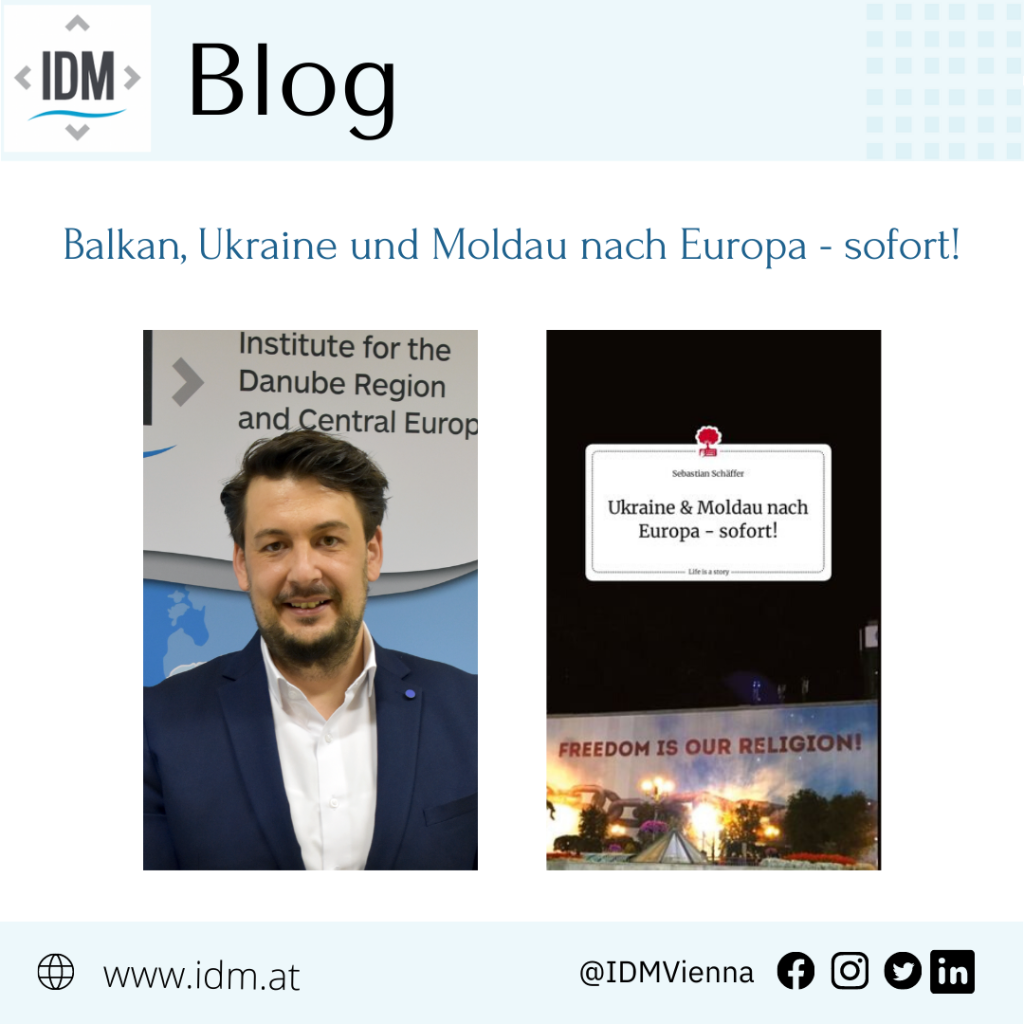
“„Gschichtn“ von Fußball, Freiheit und Zukunft”
In seinem Kommentar fordert IDM-Geschäftsführer Sebastian Schäffer eine dringende Reform des EU-Beitrittsprozesses und erklärt seine Beweggründe für die Entstehung der “Gschichtn” über die Länder des (West-)Balkans, Ukraine und Republik Moldau.
Eine dringende Reform des EU-Beitrittsprozesses
Die EU-Erweiterung ist und bleibt das wichtigste Instrument zur Transformation auf dem europäischen Kontinent. In Artikel 49 des Vertrags über die Europäische Union heißt es wie folgt:
„Jeder europäische Staat, der die in Artikel 2 genannten Werte achtet und sich für ihre Förderung einsetzt, kann beantragen, Mitglied der Union zu werden.“ Konkret heißt das: „Die Werte, auf die sich die Union gründet, sind die Achtung der Menschenwürde, Freiheit, Demokratie, Gleichheit, Rechtsstaatlichkeit und die Wahrung der Menschenrechte einschließlich der Rechte der Personen, die Minderheiten angehören. Diese Werte sind allen Mitgliedstaaten in einer Gesellschaft gemeinsam, die sich durch Pluralismus, Nichtdiskriminierung, Toleranz, Gerechtigkeit, Solidarität und die Gleichheit von Frauen und Männern auszeichnet.“
Leider ist der Beitrittsprozess in den vergangenen Jahren immer technischer und langwieriger geworden. Einzelne Mitgliedstaaten nutzten ihre Möglichkeit, Fortschritte auch ohne gerechtfertigte Gründe zu blockieren. Das geschah zu verschiedenen Zeitpunkten des Prozesses, etwabevor ein Land den Kandidatenstatus erhielt, bevor die Verhandlungen eröffnet wurden, bevor diese abgeschlossen wurden und dann auch noch vor der endgültigen Aufnahme. Das hat natürlich Auswirkungen auf die Transformationskraft der EU. Der Austritt des Vereinigten Königreichs hatte ebenfallsEinfluss darauf. Ich bin nach wie vor davon überzeugt, dass eine EU-Mitgliedschaft weiterhin für die betroffenen Länder attraktiv ist und die europäische Integration eines der wichtigsten politischen Projekte darstellt. Doch der Prozess muss dringend reformiert werden. Vorschläge dazu gibt es genug, doch es braucht mehr Mut, um die Aufgabe anzugehen. Der Sorge vor einer langen und schwierigen Vertragsrevision möchte ich entgegenhalten: Vom Vertrag von Nizza zum Vertrag von Lissabon – inklusive gescheitertem Verfassungsvertrag und zunächst negativen Volksentscheid in Irland – vergingen etwas mehr als sechs Jahre. Hätten wir direkt nach dem Brexit-Referendum den Mut gehabt, die Verträge und damit auch den Erweiterungsprozess zu reformieren, könnten wir dies bereits jetzt anwenden!
“Balkan nach Europa – sofort!”
Im Sommer 2020 fragte mich Erhard Busek, ob wir gemeinsam ein Buch zum Westbalkan schreiben wollen. Ich war sofort begeistert und habe recherchiert, was darüber von wem in den letzten Jahren publiziert wurde Gemeinsam mit einer Kollegin am IDM erstellten wir eine umfangreiche Liste von Titeln in mehreren Sprachen und kamen zu der Erkenntnis, dass es nicht unbedingt Bedarf für weitere umfassende Publikationen gibt. Zudem wurde das Projekt immer größer und es drohte langwierig zu werden. Erhard und mir verband eine gewisse Ungeduld im Hinblick auf die Umsetzung von Aktivitäten für unsere Region, was sicherlich für die Beteiligten nicht immer einfach ist. Die Plattform story.one bietet dieser Möglichkeit relativ rasch ein Buch zu veröffentlichen und sich aufgrund der maximalen Zeichenanzahl einer Geschichte von 2500 Zeichen(es können höchstens 17 Geschichten in ein Buch) auf das Wesentliche zu beschränken. Somit hatten wir den geeigneten Rahmen für unser Projekt gefunden. Die „Gschichtn“ über Grenzen, Glauben und Grausamkeiten, über Fabeln, Frieden und Fußball verknüpften wir mit unserem Plädoyer über die sofortige Aufnahme aller Westbalkanstaaten in die EU.
Ein Frühjahr, das alles veränderte…
Der 24. Februar 2022 war für uns alle ein Schock. Als dann die Ukraine und später auch die Republik Moldau sowie Georgien einen Beitrittsantrag zur EU stellten, haben wir begonnen zu überlegen, ob wir nicht eine Art Nachfolgepublikation schreiben sollten. Leider ist Erhard dann plötzlich am 13. März 2022 verstorben. Dieser neue Schock hat erneut unsere Prioritäten verschoben und das Projekt geriet in den Hintergrund. Als dann nach den Weihnachtsfeiertagen etwas Ruhe eingekehrt ist, holte ich die Idee wieder hervor und begann auszuprobieren, wie es sich anfühlt, das Buch alleine zu schreiben. Mir wurde rasch klar, dass es funktioniert.
„Ukraine & Moldau nach Europa – sofort!“
„Ukraine & Moldau nach Europa – sofort!“ ist zunächst eine Verneigung vor Erhard Busek. Es ist auch eine Verbeugung vor den Menschen, die in der Ukraine für unsere Werte kämpfen. Ich versuche – ähnlich wie bei „Balkan nach Europa – sofort!“ – durch „Gschichtn“ von Fußball, Freiheit und Zukunft Zusammenhänge aufzuzeigen, Zugehörigkeit herzustellen, Zusammengehörigkeit zu veranschaulichen, Zusammenhalt zu vermitteln und damit hoffentlich dazu beitragen, dass die Zeitenwende, wie der 24. Februar 2022 weithin inzwischen bezeichnet wird, am Ende positive Assoziationen hervorruft. Anders als in der ersten Publikation ist aber hier kein konkretes Plädoyer für eine sofortige EU-Mitgliedschaft der Ukraine und/oder Moldau enthalten, weil es nicht mit den gleichen Vorschlägen, die wir im Hinblick auf die Westbalkanstaaten gemacht haben, umsetzbar ist. Ich wollte dennoch durch den Titel bewusst eine Kontinuität in der Arbeit des IDM darstellen.
Balkan nach Europa – sofort!
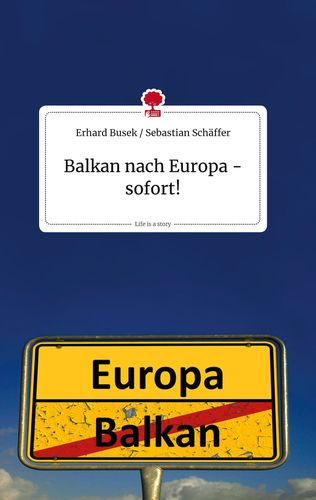
Democracy Workshops
Call for Expression of Interest for Non-Governmental Organizations to implement the Democracy Workshop Project in the Albanian Assembly
The Austrian Institute for the Danube Region and Central Europe (IDM) supported by ERSTE Foundation invites all interested non-governmental organisations (NGO) in Albania to apply for the implementation of the Democracy Workshops in the Albanian Assembly.
IDM supported by ERSTE Foundation together with the Albanian Assembly as the beneficiary, seeks to implement the Democracy Workshops in Albania with the goal of establishing them as one of the core civic education programmes of the Albanian Assembly.
The Democracy Workshop programme was originally established by the Austrian Parliament in 2007to familiarize young people with the basics of democracy, parliamentary life and media competence in all its aspects. Based on the Austrian model, the programme will be implemented in Albania. It is designed as four-hour workshops through which primary and secondary school children, with the help of selected expert trainers, can learn how parliamentary democracy works through interactive activities and the creation of a media feature.
The goal of the Democracy Workshop programme is to promote an interest in democratic and political processes as well as to contribute to a better understanding of the principles of democracy and to gain knowledge about the role of the parliament in the democratic structure of a state, the parliamentary processes, and the daily work of MPs. The workshops also strive to illustrate additional key elements for political participation: the willingness, the ability, and the courage to express an opinion and media literacy.
The selected NGO will recruit trainers who will receive the necessary trainings to deliver the workshops. The technical equipment required to conduct the workshops will be provided. In addition, the Administration of the Albanian Assembly will provide administrative support and expertise in conducting the workshops. During the initial implementation phase the project will be realized by the Institute for the Danube Region and Central Europe. This initial implementation phase will be completed by the end of May 2023. Following the completion of this phase, the Administration of the Albanian Assembly intends to continue the programme.
Eligible organisations must meet all the following criteria:
· registered according to Albanian law and in full compliance with all Albanian legal requirements;
· proven experience in recruitment and team management;
· proven experience in project management;
· have team members proficient in the English language for work on a day to day basis;
· previous experience in civic education and/or work with school children will be an asset;
· previous experience with projects in the field of democratisation, governance and human rights will be an asset.
Eligible organisations must submit the following documentation:
· letter of interest;
· CV of the person(s) representing the NGO and the working group in charge of implementing the project;
· CV of the NGO and a short description of working field of respective NGO;
· written report on a good practice (up to two pages);
· copy of the NGO registration (“Ekstrakti më i fundit nga Gjykata e Rrethit Gjyqësor Tiranë”);
· certification from the tax authorities that the NGO has no debts with Albanian fiscal authorities (Vërtetim nga organi tatimor që organizata nuk ka detyrime të pashlyera për sa i përket kontributeve për sigurimet shoqërore, sigurimet shëndetësore dhe tatimet);
· certification from the tax authorities that the NGO is active (Vërtetim nga organi tatimor mbi statusin aktiv të organizatës dhe kopje e dokumentit të regjistrimit në organin tatimor, NIPT);
· copy of the most recent approved statute (Kopje e statutit të organizatës që aplikon; varianti më i fundit);
· yearly budget of the organization and official financial disclosures of the last two years (Buxheti vjetor i organizatës, pasqyrat financiare të dy viteve të fundit me firmën dhe vulën e organizatës sipas formatit të deklaruar në organet tatimore);
· copy of any other documentation (e.g., performance report, certificates, awards, publications) that addresses the qualification requirements as listed above.
NGOs may send their application documents as PDF-files, in English, via e-mail to the Institute for the Danube Region and Central Europe, Robin Gosejohann, r.gosejohann@idm.at by 30 September, 2022 (COB).
A certified translation of official documents is not necessary. Please note: any costs incurred for the application will not be covered.
The applications will be reviewed by a screening committee against the listed requirements. Organisations meeting these requirements will be contacted and notified of further steps.
Call for Expression of Interest (as a PDF-document)
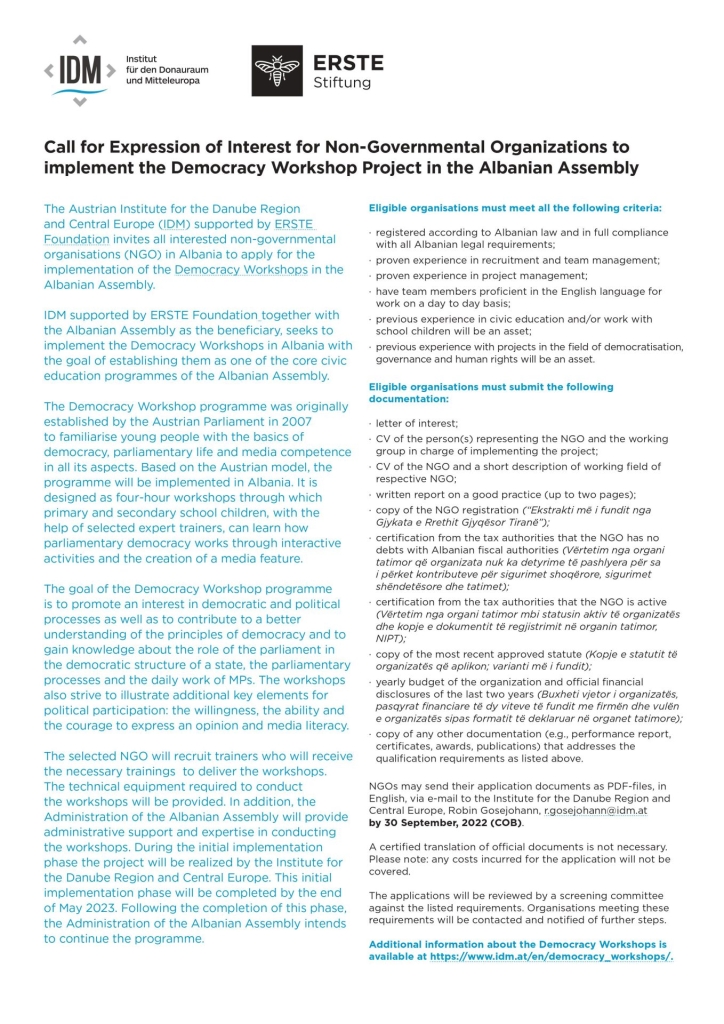
You will find more information about this project hier.
Nun sag’, wie hältst du’s mit der EU-Erweiterung?
Meinung der Europa-Abgeordneten zum EU-Beitritt der Westbalkanländer
“Balkan nach Europa – sofort” forderten Erhard Busek und Sebastian Schäffer in ihrem Appell an die Europäische Union. Doch wie lauten die Positionen der österreichischen EntscheidungsträgerInnen im EU-Parlament zur Frage der EU-Erweiterung?
Das IDM-Team wollte es genau wissen und bat die VolksvertreterInnen, ihre persönlichen Positionen, Visionen und Handlungsspielräume zu erläutern. Neun von insgesamt 18 Abgeordneten darunter MandatarInnen aller fünf Parteien haben uns geantwortet und ihre Sicht der Dinge dargelegt
Wie beantworten die PolitikerInnen die Gretchenfrage zur Zukunft unserer Nachbarschaft? Informieren Sie sich über die unterschiedlichen Positionen:
Monika Vana, Thomas Waitz und Sarah Wiener
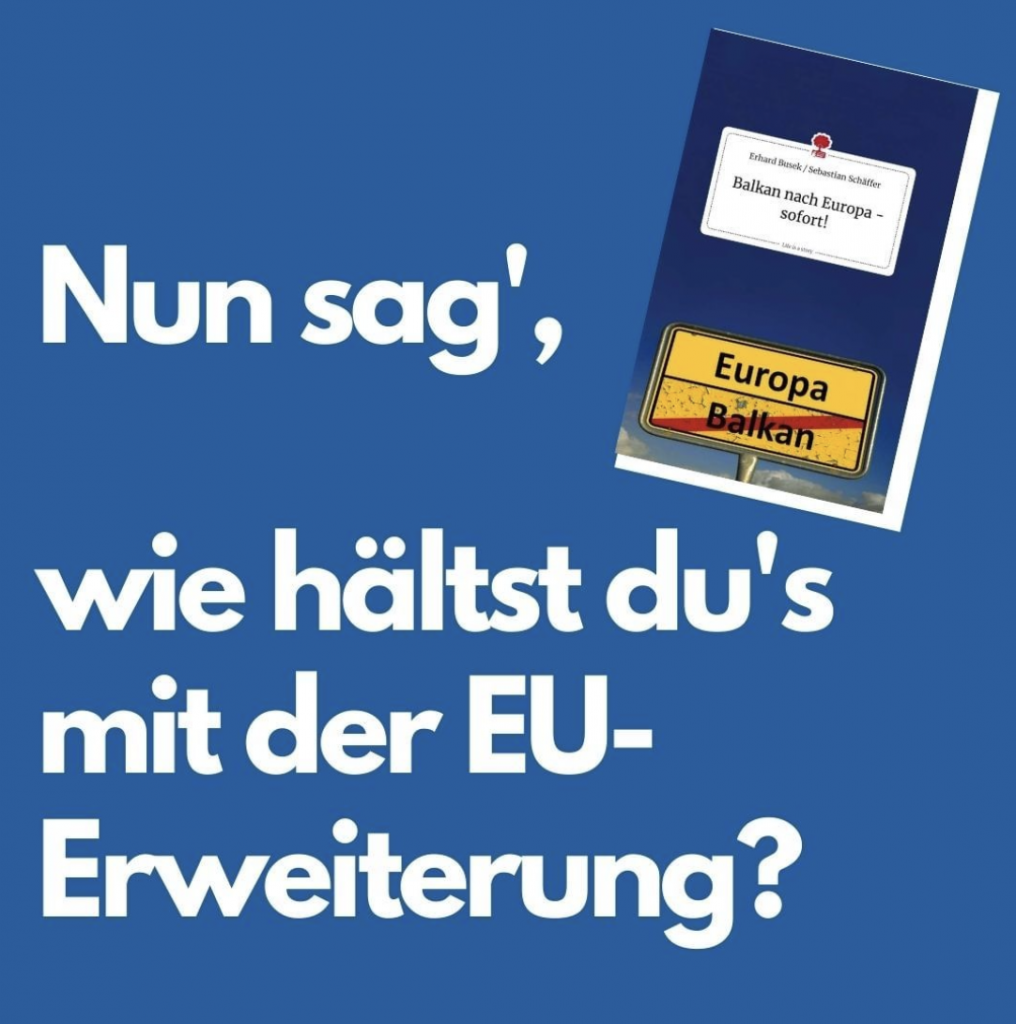
Und wie würden Sie diese Fragen beantworten?

